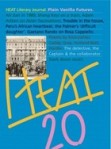Two more journals in my endless attempt to keep up to date!
Evelyn Araluen and Jonathan Dunk (editors), Overland 251 (Winter 2023)
(Some of the content is online at the Overland website, and I’ve included links)
As always, this issue of Overland is full of good things. In particular, there’s ‘Close to the subject‘ by Bundjalung and Kullilli journalist Daniel Browning, whose mellifluous voice is familiar to me from his stint as presenter of ABC’s Awaye. The book Close to the Subject was published by Magabala Books in 2023. On the strength of this essay, it’s worth reading. Of his time as a journalist for the ABC, Browning writes:
My stories are always collaborative, and I try to produce content that represents not simply the who, what and why — but the cultural context in which these dialogues take place. I no longer excise myself from my stories, as I used to do (although I always insist that my team practise a simple rule: you are always the least important person in the room). … [The kind of journalism I practise] is one which embeds my blackfella subjectivity. It centres my own story, but only to make clear that I am in relationship with the person I am conversing with. By establishing my own credentials, I am drawing a reflexive enclosing circle around the conversation – its cultural context.
(page 51)
There are a other excellent articles on First Nations Issues from Barry Corr and Hana Pera Aoke, essays on literary matters, and a heart-wrenching episode of World War Two history from Bill Gammage.
The poetry section is wonderfully rich. I’ll just mention ‘Nothing out of the ordinary‘ by Heather Taylor-Johnson. The speaker of the poem lists any number of extraordinary adventures – mainly involving skydiving – that, she says, never happened. The negative is clearly ironic in some way, and you live with the tension of that until the very last line. It wasn’t until I heard Heather Taylor-Johnson read the poem at an Avant-Gaga evening at Sappho’s cafe that I realised with full force that (excuse the spoiler) the poem is an elegy.
Of the stories, ‘The expectations of sparrows’ by Jane Downing (which the website has tagged ‘online soon’) stands out. Its opening sentence, ‘Mavis was contemplating death,’ led me to expect one more story about a young woman suffering from depression as a result of chaotic sexual experiences or worse. But no! Mavis is in a cemetery when a pimply young man approaches her with a proposition involving his desecrating some graves and the two of them sharing the reward when she dobs him in. It’s a tale centred on a solid ethical dilemma, with some finely judged twists.
Alexandra Christie (editor), Heat Series 3 Nº 11 (Giramondo 2023)
I’m not getting on well with Heat. According to its website, it has always aimed to ‘publish innovative Australian and international writers of the highest standard’. The current issue accordingly includes work by two Australian writers and two international writers. So far so good. But look a bit closer and see that of the Australian writers one is listed as a publisher of Heat, and the other is on the editorial advisory board, while one of the ‘international’ writers and both translators live in the USA. Is all excellence, one wonders, to be found within the Heat family or imported from the USA? Must all translations into English include words like ‘faucet’ and ‘gotten’?
Evelyn Juers’ ‘Totality in Wallal. Woolf in Yorkshire. Einstein in Scharbeutz.’ is the high point of the issue, an essay on biography as a form, full of fascinating details from the lives and influence of its subjects. I enjoyed the three prose poems (flash fictions?) from Suneeta Peres da Costa, and the excerpt from Sara Mesa’s novel Un Amor, translated by Katie Whittemore, delivers a terrific final twist that made me almost forgive its leaking faucet. (The excerpt is on the Heat website.)
I hope to be less grumpy in my next journal catch-up.




